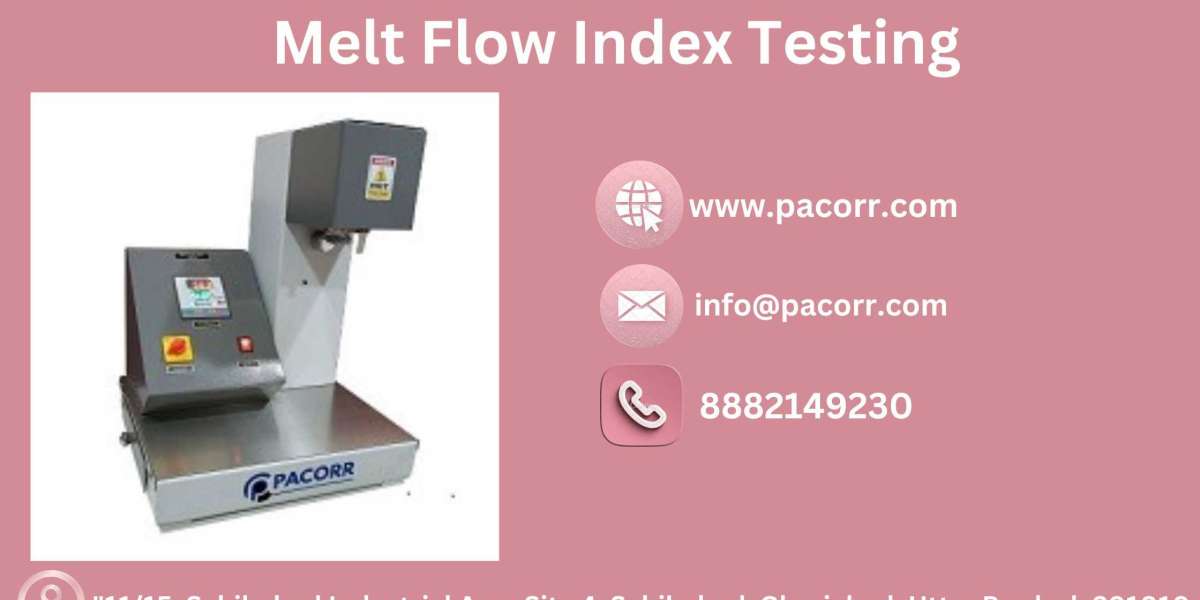Introduction
In the ever-evolving world of polymer and plastic manufacturing, ensuring the quality and consistency of materials is paramount. One critical parameter that manufacturers monitor is the melt flow index (MFI). The Melt Flow Index Tester is a vital tool in this regard, enabling precise measurement of the flow characteristics of thermoplastic polymers. In this article, we will delve into the importance of the Melt Flow Index Tester, its working principle, applications, and benefits.
What is the Melt Flow Index?
The Melt Flow Index (MFI) is a measure of the ease with which a thermoplastic polymer can flow when melted. It is expressed in grams per 10 minutes (g/10 min) and indicates the rate at which a polymer can flow through a specified capillary under a defined load and temperature. The MFI value is crucial for determining the processing behavior and quality of the polymer, as it impacts molding, extrusion, and other manufacturing processes.
Importance of the Melt Flow Index Tester
The Melt Flow Index Testing is an indispensable instrument in the plastics industry for several reasons:
- Quality Control: By measuring the MFI, manufacturers can ensure the consistency and quality of their polymer products. Variations in MFI can indicate changes in molecular weight, composition, or contamination, which can affect the final product's properties.
- Material Selection: Different applications require polymers with specific flow characteristics. The MFI helps in selecting the appropriate material for a given application, ensuring optimal performance and efficiency.
- Process Optimization: Understanding the MFI allows manufacturers to fine-tune their processing parameters, such as temperature and pressure, leading to improved productivity and reduced waste.
Working Principle of the Melt Flow Index Tester
The Melt Flow Index Testing price operates based on a simple yet effective principle. Here’s a step-by-step overview of the process:
- Sample Preparation: A small amount of the polymer sample is prepared and placed in the heating chamber of the tester.
- Heating: The sample is heated to a specific temperature to ensure it is in a molten state. The temperature is usually standardized based on the type of polymer being tested.
- Application of Load: A predetermined load or weight is applied to the molten polymer. This weight forces the polymer to flow through a narrow capillary or die.
- Measurement: The amount of polymer that flows through the capillary in a set time (typically 10 minutes) is collected and weighed. This weight is then used to calculate the MFI value.
Applications of the Melt Flow Index Tester
The Melt Flow Index Teste is widely used in various industries, including:
- Plastic Manufacturing: To ensure the quality and consistency of plastic products such as films, sheets, and molded items.
- Polymer Research and Development: For developing new polymer formulations and understanding their flow properties.
- Quality Assurance in Packaging: To verify the suitability of polymers used in packaging materials.
- Automotive Industry: For evaluating the flow properties of polymers used in automotive components.
Benefits of Using the Melt Flow Index Tester
- Precision and Accuracy: The tester provides accurate measurements, ensuring reliable data for quality control and material selection.
- Efficiency: Quick and easy to use, the tester allows for rapid analysis, enabling timely adjustments in the production process.
- Cost-Effective: By ensuring the quality of polymers and optimizing processes, the Melt Flow Index Tester helps reduce material waste and operational costs.
- Compliance: The tester ensures that materials meet industry standards and regulatory requirements, facilitating market acceptance and customer trust.
Conclusion
The Melt Flow Index Tester is a crucial tool in the polymer and plastics industry, offering precise measurement of flow characteristics that are vital for quality control, material selection, and process optimization. By understanding and utilizing the Melt Flow Index, manufacturers can enhance product quality, improve efficiency, and stay competitive in a demanding market. For more information on the Melt Flow Index Tester and other advanced testing equipment, visit Pacorr Testing Instruments Pvt Ltd.
Frequently Asked Questions (FAQ)
What is the purpose of the Melt Flow Index Tester?
The Melt Flow Index Teste measures the flow rate of melted thermoplastic polymers, helping manufacturers ensure quality control, select appropriate materials, and optimize processing conditions.
How does the Melt Flow Index affect polymer processing?
The MFI indicates the flow behavior of a polymer during processing. A higher MFI means the polymer flows easily, suitable for processes like injection molding, while a lower MFI indicates a more viscous polymer, ideal for applications requiring higher strength and durability.
Can the Melt Flow Index Tester be used for all types of polymers?
Yes, the Melt Flow Index Tester Price can be used for various thermoplastic polymers, including polyethylene, polypropylene, polystyrene, and more. The testing conditions may vary based on the polymer type.
How often should the Melt Flow Index be tested?
The frequency of MFI testing depends on the specific manufacturing process and quality control requirements. It is typically performed during material selection, production runs, and whenever there is a change in material or processing conditions.
What are the standard testing conditions for the Melt Flow Index?
Standard testing conditions for MFI typically involve a temperature of 190°C and a load of 2.16 kg for polyethylene. However, these conditions can vary based on the polymer type and industry standards.
By leveraging the Melt Flow Index Tester, manufacturers can achieve higher quality products, streamline their processes, and meet stringent industry standards, making it an essential tool in modern polymer manufacturing.







